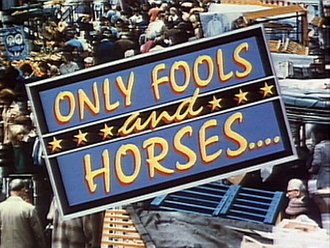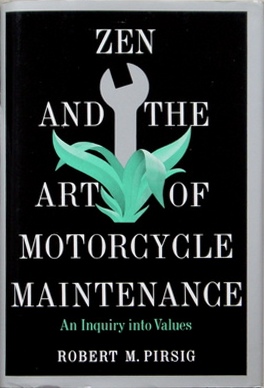In the essential Boomer text, Zen and the Art of Motorcycle Maintenance one of the chief ideas was the difficulty of defining what we mean by “quality”. Almost everyone knows what quality is and can easily spot the presence or lack of it in something. But the word itself, the concept, the thing of it, is difficult to describe. So, in the absence of a clear definition, the presence of quality can become a claim by a person selling a thing which, their patter maintains, possesses the elusive attribute.
So even though everyone knows what quality is, it is possible, with a good enough story, to convince someone that something which may not actually possess quality, does possess quality. The key is the story. With a good enough story, anything is anything. You can even sow doubt in a person’s mind, making them believe that they actually lack the ability to discern quality, but that luckily, you are there to help them; for a small fee.
The old story of the emperor’s new clothes is an illustration of what happens when a lie reaches critical mass to leave an entire herd deluded. If everyone claims to be able to discern the quality of the invisible garment, it takes balls to go against the herd, and, herds being what they are, the balls to differ is rare. So, an attribute which is difficult to define, leaves wriggle room for the unscrupulous and the potential danger of delusion for the naïve. You can almost hear Arthur Daly or Dell Boy spin it, “Look at that! That’s quali’y that is.”

Value
This is where Mariana Mazzucato starts out from in her book on economics, The Value of Everything: Making and Taking in the Global Economy. In Mazzucato’s thesis the word “value” is in many ways a synonym for “quality”, and she shows how some clever-clever salespeople have sold a pup to the entire world with a fancy story that somehow has the effect of equating value with price: if a thing is expensive it must be good, right? “Look at that! Now that’s quali’y.”
Mazzucato shows how this simple con has allowed the Arthur Dalys of big finance to enrich themselves and their friends by extracting value from goods created by the wider working community. They do this primarily by blurring the distinction between value creation and value extraction. This is the Making and Taking aspect of the book.
We see it all the time in the arts. Irish musicians and actors will be more than familiar with the publican who asks them to work for nothing because, unlike him, they “enjoy” their work. Therefore, so his thinking goes, that is reward enough and the publican can extract the economic value from the skills of the artistes. The story the publican spins in this transaction is the implicit suggestion that the arts are actually worthless.

Mariana Mazzucato 2016.
The Con
Everyone can see the con when it’s that glaring, but in the wider world of high finance it’s all a bit faster and meaner: worker’s wages stagnate while shareholders extract fat bonuses. Energy company shareholders holiday in the sun while families decide between food and heat. Mazzucato’s book is a reveal of the stories and patter and understandings used and exploited by corporations and swallowed by the public and by governments, that results in wealth being sucked to the top while wages stagnate and inequality increases.
Mazzucato’s goal is to unmask the tawdry yarns of modern capitalism’s snake-oil salesmen who profess to be the high priests of identifying value: the bankers and corporations essentially claiming welfare in the form of tax breaks while creaming from the top of community-created wealth to transfer to their shareholders, all with the connivance of a bought-out political class, many of whom are corporate shareholders themselves. She writes:
“If the assumption that value is in the eye of the beholder is not questioned, some activities will be deemed to be value creating and others will not, simply because someone – usually someone with a vested interest – says so, perhaps more eloquently than others… If bankers, estate agents and bookmakers claim to create value rather than extract it, mainstream economics offers no basis on which to challenge them, even though the public might view their claims with scepticism.”

Side Street in Dignity Village, Portland, Oregon.
Fake Stories
Derelict American cities are a living example of wealth extraction, leaving a trail of destruction in its wake while the top 1% live the high life. It is in untangling these stories, these modern myths of economics, that Mazzucato hopes to bring clarity in the necessary project to somehow reimagine capitalism, so that it works once more for the benefit of all, creating a thriving world rather than a dying one.
At the centre of this entanglement of fake stories, spun by the elite like so many spider-webs, she shows that what is afoot is nothing more than a cheap con being perpetrated by groups of people with stories so shoddy that as soon as you see the move and the angle you can’t unsee it. Theirs is a strategy that depends essentially on the manipulation of one human weakness: convincing people that they are solely to blame for their own condition. Not the system. But their own character defects.
And people buy it, every time. It’s not unlike the original sin the church used to so successfully sell. In the end, they claim, it’s all your own fault. So, while the poor sit self-tortured in self-flagellation for their own condition, which is almost always an outcome of social and economic inequality, the sales shaman steals away with the pensions and anything else he can manage to capture.

Quality
Robert Pirsig, author of Zen and the Art of Motorcycle Maintenance spent a book trying to get a grasp on the meaning of the term “quality”, an attribute whose presence or absence is clear to everyone. That was the mystery he was trying to pin down. How is it everyone knows when something has quality but can’t quite describe it?
In the same way, you don’t need a PhD in economics to see that the attribute of quality is severely lacking in today’s capitalism. You have only to look at the manner in which business is being conducted that it is delivering neither quality nor value, just endless bonuses to a select few and endless grinding poverty to the many, no matter how hard they might work.
Marianna Mazzucato has unmasked the shoddy yarn driving this fountain-pen theft of communal wealth, in a book so timely and revealing that it simultaneously exudes the twin attributes of quality and value while providing much-needed insights into the vexing question: why is capitalism only really working for a select few? The answer is simple: the herd has been deluded by clever economic patter: “That’s quali’y, tha’ is.”




